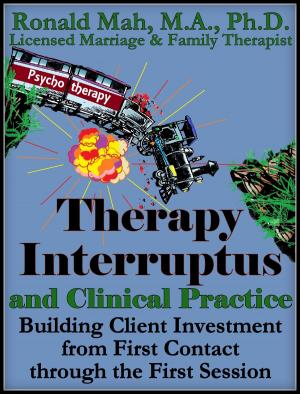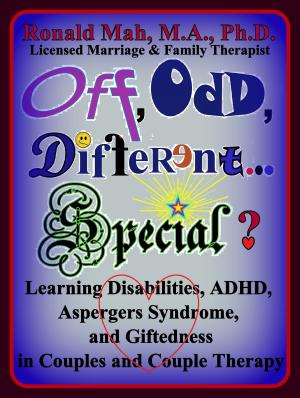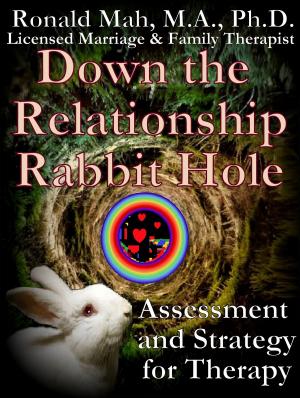Born that Way, Temperamental Challenges in Relationships and Therapy
Nonfiction, Health & Well Being, Psychology, Family Therapy, Counselling| Author: | Ronald Mah | ISBN: | 9781311141385 |
| Publisher: | Ronald Mah | Publication: | December 21, 2013 |
| Imprint: | Smashwords Edition | Language: | English |
| Author: | Ronald Mah |
| ISBN: | 9781311141385 |
| Publisher: | Ronald Mah |
| Publication: | December 21, 2013 |
| Imprint: | Smashwords Edition |
| Language: | English |
“Born that Way, Temperamental Challenges in Relationships and Therapy.” Temperament, which is a non-experiential characteristic from genetic inheritance interacts with environmental experiences such as family and culture. Therapists will see how in-born temperament influence childhood attachment and later adult intimacy and relationships. Temperamental evaluation provides another perspective- an important non-pathologizing perspective to clinical work beyond children, but also with adult individuals, couples, and families. Evaluation and assessment from non-temperamental perspectives is contrasted to using temperamental theory to determine therapeutic strategies, interventions, and goals. Temperamental traits are shown to have bi-directional mutual influences with a number of impactful developmental factors: attachment, learning disabilities, gender, culture, substance use or abuse, and anxiety and depression along with other psychopathology. Therapists will be charged to identify personal, individual, and systemic gender and cultural values in particular that encourage or discourage specific temperamental traits. Easy to difficult temperamental profiles mitigate or exacerbate any problematic dynamics, including within the family-of-origin or a current adult system such as a marriage. Different profiles can inherently make certain tasks, situations, or occupations more or less difficult.
Temperament is a powerfully empowering alternative perspective to the Attention Deficit Hyperactivity Disorder diagnosis that therapists can use to direct affirmative intervention rather than initiate labeling leading to psychopharmacological treatment. Individuals with difficult temperaments have predictable problems with environmental and relationship stresses- in particular starting with peers in childhood and leading to eventual intimate relationships in couples and in the family. These traits can be anticipated for challenges and can be successfully addressed and supported by knowledgeable therapists, teachers, partners, parents, and colleagues/peers. Therapists are directed to evaluate and advocate positive fit between important intimates and challenged individuals. Partners, parents, and other concerned individuals are educated and coached by temperament-savvy therapists. The more powerful or authoritative person such as the parent, teacher, or therapist, or the more aware and understanding individual is often required to monitor and regulate the difficult temperament of the other person. This is clearly required developmentally of the therapist, parent, or teacher for the young child, but may also be relevant for the individual in an intimate relationship with another. Such invested people facilitate conscious development of the other person's abilities to self-monitor and subsequently, self-regulate with appropriate and successful choices and behaviors.
“Born that Way, Temperamental Challenges in Relationships and Therapy.” Temperament, which is a non-experiential characteristic from genetic inheritance interacts with environmental experiences such as family and culture. Therapists will see how in-born temperament influence childhood attachment and later adult intimacy and relationships. Temperamental evaluation provides another perspective- an important non-pathologizing perspective to clinical work beyond children, but also with adult individuals, couples, and families. Evaluation and assessment from non-temperamental perspectives is contrasted to using temperamental theory to determine therapeutic strategies, interventions, and goals. Temperamental traits are shown to have bi-directional mutual influences with a number of impactful developmental factors: attachment, learning disabilities, gender, culture, substance use or abuse, and anxiety and depression along with other psychopathology. Therapists will be charged to identify personal, individual, and systemic gender and cultural values in particular that encourage or discourage specific temperamental traits. Easy to difficult temperamental profiles mitigate or exacerbate any problematic dynamics, including within the family-of-origin or a current adult system such as a marriage. Different profiles can inherently make certain tasks, situations, or occupations more or less difficult.
Temperament is a powerfully empowering alternative perspective to the Attention Deficit Hyperactivity Disorder diagnosis that therapists can use to direct affirmative intervention rather than initiate labeling leading to psychopharmacological treatment. Individuals with difficult temperaments have predictable problems with environmental and relationship stresses- in particular starting with peers in childhood and leading to eventual intimate relationships in couples and in the family. These traits can be anticipated for challenges and can be successfully addressed and supported by knowledgeable therapists, teachers, partners, parents, and colleagues/peers. Therapists are directed to evaluate and advocate positive fit between important intimates and challenged individuals. Partners, parents, and other concerned individuals are educated and coached by temperament-savvy therapists. The more powerful or authoritative person such as the parent, teacher, or therapist, or the more aware and understanding individual is often required to monitor and regulate the difficult temperament of the other person. This is clearly required developmentally of the therapist, parent, or teacher for the young child, but may also be relevant for the individual in an intimate relationship with another. Such invested people facilitate conscious development of the other person's abilities to self-monitor and subsequently, self-regulate with appropriate and successful choices and behaviors.















